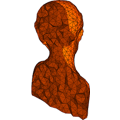- the number of iterations for the full sequence of atomic operations performed (listed in the above description)
- Type: unsigned int
-
Default:
1
|
CGAL 5.3 - Tetrahedral Remeshing
|
|
CGAL 5.3 - Tetrahedral Remeshing
|

CGAL::Tetrahedral_remeshing::Remeshing_vertex_base_3CGAL::Tetrahedral_remeshing::Remeshing_cell_base_3CGAL::Tetrahedral_remeshing::Remeshing_triangulation_3Modules | |
| Concepts | |
| Classes | |
Functions | |
| template<typename Traits , typename TDS , typename SLDS , typename NamedParameters > | |
| void | CGAL::tetrahedral_isotropic_remeshing (CGAL::Triangulation_3< Traits, TDS, SLDS > &tr, const double &target_edge_length, const NamedParameters &np) |
| remeshes a tetrahedral mesh. More... | |
| template<typename Tr , typename CornerIndex , typename CurveIndex > | |
| CGAL::Triangulation_3< typename Tr::Geom_traits, typename Tr::Triangulation_data_structure > | CGAL::convert_to_triangulation_3 (CGAL::Mesh_complex_3_in_triangulation_3< Tr, CornerIndex, CurveIndex > c3t3) |
converts the triangulation contained in the input to a Triangulation_3. More... | |
| CGAL::Triangulation_3<typename Tr::Geom_traits, typename Tr::Triangulation_data_structure> CGAL::convert_to_triangulation_3 | ( | CGAL::Mesh_complex_3_in_triangulation_3< Tr, CornerIndex, CurveIndex > | c3t3 | ) |
#include <CGAL/tetrahedral_remeshing.h>
converts the triangulation contained in the input to a Triangulation_3.
This function should be used to generate a valid triangulation for tetrahedral remeshing, when the input triangulation is generated with the tetrahedral mesh generation package.
| Tr | is the underlying triangulation for Mesh_complex_3_in_triangulation_3. It can be instantiated with any 3D regular triangulation of CGAL provided that its vertex and cell base classes are models of the concepts MeshVertexBase_3 (refined by RemeshingCellBase_3) and MeshCellBase_3 (refined by RemeshingVertexBase_3), respectively. |
| CornerIndex | is the type of the indices for feature corners. If c3t3 has been generated using CGAL::make_mesh_3(), it must match the Corner_index type of the model of the MeshDomainWithFeatures_3 concept used for mesh generation. |
| CurveIndex | is the type of the indices for feature curves. If c3t3 has been generated using CGAL::make_mesh_3(), it must match the Curve_index type of the model of the MeshDomainWithFeatures_3 concept used for mesh generation. |
| c3t3 | the complex containing the triangulation to be remeshed. |
| void CGAL::tetrahedral_isotropic_remeshing | ( | CGAL::Triangulation_3< Traits, TDS, SLDS > & | tr, |
| const double & | target_edge_length, | ||
| const NamedParameters & | np | ||
| ) |
#include <CGAL/tetrahedral_remeshing.h>
remeshes a tetrahedral mesh.
It is recommended to use CGAL::Tetrahedral_remeshing::Remeshing_triangulation_3 for the first parameter, as it inherits from Triangulation_3 with a TDS suitable for this function.
This function takes as input a 3-dimensional triangulation and performs a sequence of atomic operations in order to generate as output a high quality mesh with a prescribed uniform density. These atomic operations are performed as follows:
This remeshing function can deal with multi-domains, boundaries, and features. It preserves the geometry of subdomains throughout the remeshing process.
Subdomains are defined by indices that are stored in the cells of the input triangulation, following the MeshCellBase_3 concept (refined by RemeshingCellBase_3). The surfacic interfaces between subdomains are formed by facets whose two incident cells have different subdomain indices. The edges where three or more subdomains meet form feature polylines, and are considered as constrained edges.
| Traits | is the geometric traits, model of RemeshingTriangulationTraits_3 |
| TDS | is the triangulation data structure for Triangulation_3, model of TriangulationDataStructure_3, with cell base model of RemeshingCellBase_3 and vertex base model of RemeshingVertexBase_3. |
| SLDS | is an optional parameter for Triangulation_3, that specifies the type of the spatial lock data structure. |
| NamedParameters | a sequence of Named Parameters |
| tr | the triangulation to be remeshed, of type Triangulation_3<Traits, TDS, SLDS>. Remeshing_triangulation is a helper class that satisfies all the requirements of its template parameters. |
| target_edge_length | the uniform target edge length. This parameter provides a mesh density target for the remeshing algorithm. |
| np | optional sequence of Named Parameters among the ones listed below |
| |
| |
| |
| |
| |
|